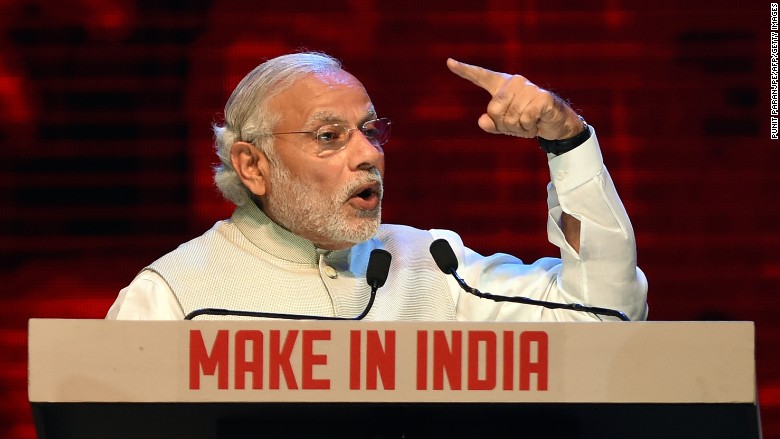
Tim Cook is very excited about India.
During Apple's most recent earnings call, the CEO revealed that iPhone sales in the country grew 76% over the previous year. He described India's potential as "incredibly exciting," and its demographics, with an average age of just 27, as "incredibly great."
This is the kind of starry-eyed talk once reserved for China. But India now finds itself in an enviable position: Economic growth is outpacing that of all other large nations, and plummeting oil prices have slashed its bill for energy imports.
Meanwhile, the other members of the original BRIC grouping -- Brazil, Russia, and China -- have all stumbled.
Narendra Modi, who will celebrate his second anniversary as prime minister in May, has been responsible for much of the recent buzz around India's economy. He has spent huge amounts of political capital trying to push common sense economic reforms through parliament.
Modi has also packed his schedule with foreign trips, during which he exhorts global companies to "Make in India." Investment dollars from abroad have flooded in: GE (GE), Airbus (EADSF), Xiaomi, Foxconn and GM (GM) have all inked deals to expand their manufacturing operations in India.
The prime minister's campaign reached fever pitch this week in Mumbai, when a government-sponsored event drew executives from many of the world's top companies to a "Make in India" summit. The prime minister touted reforms, and invited foreign executives to invest. (CNN hosted its Asia Business Forum on Sunday in Mumbai.)
Related: India bucks global trend with 7.3% growth
Yet there is growing unease over India's prospects: The country's GDP numbers have diverged from other indicators, and their quality has been questioned. India's companies are carrying high levels of debt and have failed to snap out of their funk. Mumbai's Sensex stock market index has shed about 20% in the past 12 months.
Even more worrying is that many of Modi's promised reforms have failed to materialize. A proposal to establish a nationwide sales tax has languished in parliament, leaving India's byzantine system of state duties in place.
On another of Modi's priorities -- reducing red-tape for small businesses -- the needle has scarcely moved. India ranks 130th in a World Bank index measuring the regulatory burden on small firms, an improvement of just four spots from 2015. The country's infrastructure remains woefully inadequate, and will take decades to upgrade.
India's accelerating growth revs up car sales
Arvind Subramanian, the government's chief economic adviser, has lamented the lack of progress on the national goods and services tax, but remains hopeful that other reforms -- and increased competition among the states -- will ensure progress.
"When people in India talk wistfully about the Chinese model and top-down development, it's almost a silly wistfulness because you know you're stuck with the system you have," Subramanian has said.
Yet with many of the world's major economies struggling, India remains an attractive bet for growth-hungry multinationals. The country's growing middle class has money to spend, and its youthful population offers huge potential. Apple (AAPL), for one, is backing up its excitement with action: The company recently filed an application to open its first retail stores in India.


